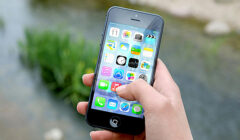An Appetite for App
There is apparently an app for everything! There is an app that lets you swap faces with your friends in your photos.There is an app to tell you when the best point is in a movie to go to the bathroom. There is an exploding kitty app. I know I am a techno-dino. I use my “phone” to primarily make photo calls. I do like the navigation device as well. I’m not much for texting and I need a bigger screen for my emails so my phone gets used mostly for calls. I watch bewildered as people a third of my age use their thumbs to fly across miniature screens, whipping out their phones at every free second to check something…anything.
I used to lament the small screen…its changing the way children interact with each other, doesn’t lend itself to contemplation or deep thought, kids have very short attention spans now etc., then I read an article in the New Yorker magazine that mentioned that Socrates bemoaned the fact that the new act of writing things down on tablets was going to ruin the mind. My history mentor Professor J. Rufus Fears always said, ”Those that forget history are destined to repeat it. Those that remember history repeat it anyways!”
So in the vein of looking for the good, let me recommend some health apps that might make a difference in your health. This is by no means an exhaustive list, it’s just a few that are popular or interesting.
First we start with the popular and obvious like myfitnesspal and noon. These are very popular and comprehensive apps that track your activities, your calories etc. Chronometer is also very detailed when it comes to tracking your macros…meaning carbs, fats, and protein. These are great apps that provide a lot of information but require you to input data as well. They are only as good as the data you enter. But they do act as personal coaches of sorts, helping you to be more accountable if only to yourself and the app. That’s a good thing.
 For those of you who like it simpler I have two great apps for you. You are prowling the grocery store aisles, your head spins from all the stuff you should be avoiding, added sugars, seed oils, certain preservatives, additives etc. There are two apps I know of that make it very easy. The first is Bobby Approved. It’s an app by Bobby Flay, the Michelin chef, and you just scan the code on the bottle or item and Bobby will tell you if he approves of it. Let me tell you he doesn’t approve of much. It’s a super easy to use app even for a Boomer like myself. A very similar app is Yuka which also uses a scanner to read the barcode on the food and give it a health rating. I like both apps which are both easy to use and have slightly different ways of judging the foods. The Yuka app has a saturated fat rating on the foods but if you believe (as the vast bulk of the literature actually shows) that saturated fats are not bad for you this is going to affect their rating needlessly.
For those of you who like it simpler I have two great apps for you. You are prowling the grocery store aisles, your head spins from all the stuff you should be avoiding, added sugars, seed oils, certain preservatives, additives etc. There are two apps I know of that make it very easy. The first is Bobby Approved. It’s an app by Bobby Flay, the Michelin chef, and you just scan the code on the bottle or item and Bobby will tell you if he approves of it. Let me tell you he doesn’t approve of much. It’s a super easy to use app even for a Boomer like myself. A very similar app is Yuka which also uses a scanner to read the barcode on the food and give it a health rating. I like both apps which are both easy to use and have slightly different ways of judging the foods. The Yuka app has a saturated fat rating on the foods but if you believe (as the vast bulk of the literature actually shows) that saturated fats are not bad for you this is going to affect their rating needlessly.

That’s right, saturated fat is NOT bad for you. The most prestigious journal in cardiology is the Journal of the American College of Cardiology…JACC. In 2020 they published this article.
Saturated Fats and Health: A Reassessment and Proposal for Food-Based Recommendations: JACC State-of-the-Art Review

Their conclusion: The recommendation to limit dietary saturated fatty acid (SFA) intake has persisted despite mounting evidence to the contrary. Most recent meta-analyses of randomized trials and observational studies found no beneficial effects of reducing SFA intake on cardiovascular disease (CVD) and total mortality, and instead found protective effects against stroke. Although SFAs increase low-density lipoprotein (LDL) cholesterol, in most individuals, this is not due to increasing levels of small, dense LDL particles, but rather larger LDL particles, which are much less strongly related to CVD risk. It is also apparent that the health effects of foods cannot be predicted by their content in any nutrient group without considering the overall macronutrient distribution. Whole-fat dairy, unprocessed meat, and dark chocolate are SFA-rich foods with a complex matrix that are not associated with increased risk of CVD. The totality of available evidence does not support further limiting the intake of such foods. Remember this is from the cardiologist specialists themselves!!!
So, enough with the angry birds and sudoku apps…download something that can actually help you stay healthy. You carry your phone with you everywhere, why not use it in the grocery store as well? Until next month…get well and stay well. JT BARRY MD










